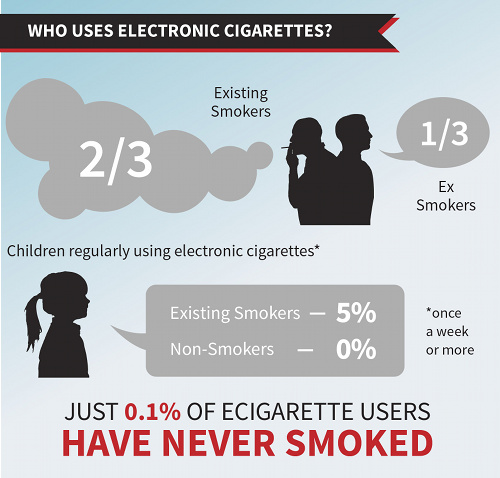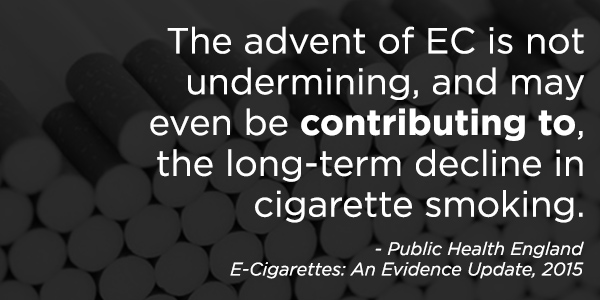
Amongst all the recent negative media stories on e-cigarettes a new report by Public Health England (PHE) has shone a positive light on e-cigarettes.
Although the media headlines are focused on how ‘E-Cigs Could Be Prescribed on the NHS’ this is not the main focus of the report.
The key messages from the report are:- Vaping is 95% safer than smoking
- There has been an overall shift in the public’s inaccurate perception of e-cigarettes being as harmful as cigarettes.
- Stop smoking services should support smokers using e-cigarettes to quit by offering them behavioural support
- There is no evidence that e-cigarettes are undermining the long-term decline in cigarette smoking
Vaping is 95% safer than smoking
Contents
- E-Cigarettes as a Gateway
- The Re-normalization Argument
- PHE's View on the TPD
- E-Cigs as a Way to Quit Smoking
- E-Cigarette Safety
- Public Perception of E-Cigs
- Additional Points
- The Welsh Ban
E-Cigarettes as a Gateway

The argument that vaping acts as a gateway to smoking for children and non-smokers has been a firm favourite of the anti-vaping zealots.
Previous research by ASH, Smoking in England and Nicotine Policy have shown the number of never-smokers and youth who use e-cigarettes to be extremely low.
Public Health England have echoed these findings in their report, stating:
“Current EC (ecig) use among never smokers is very low, estimated to be 0.2%.”And
“Regular EC use among youth is rare with around 2% using at least monthly and 0.5% weekly… Whilst there was some experimentation with EC among never smoking youth, prevalence of use (at least monthly) among never smokers is 0.3% or less.”They conclude by saying e-cigarettes attract only a few people who never smoked into regular use, and the vast majority of vapers use e-cigarettes as a way to reduce harm from smoking or to try to quit smoking cigarettes.
E-Cigarettes therefore may be contributing to the decline in cigarette smoking as opposed to undermining it.
We're really pleased that PHE looked at the facts available for their report, rather than jumping on the 'think of the children' bandwagon.
Unfortunately, across the pond in California the opposite has happened. The SBX2 5 is about to pass classing e-cigarettes as tobacco products and leading to strict regulations in the state that has the highest concentration of vape shops in the country - many of which are in danger of going out of business.“Current EC use among never smokers is very low, estimated to be 0.2%.”
The Renormalization Argument

The renormalization argument has been the key reason to ban vaping in public places. We’ve previously debunked this idea by giving 10 reasons how vaping is de-normalizing smoking, not renormalizing it.
PHE has finally put this argument to rest by pointing out that since e-cigarettes were introduced into the market, cigarette smoking in adults and youth has declined and overall nicotine use in adults has also declined.
They conclude:“These findings, to date, suggest that the advent of EC is not undermining, and may even be contributing to, the long-term decline in cigarette smoking.”
Public Health England’s View on the TPD

The TPD which comes into force next year will make e-cigarettes more strictly regulated.
You can read more about the proposed regulations and what you can do about it here.
PHE recognise that the current regulatory structure for e-cigarettes has worked well so far, but admit “protecting non-smoking children and ensuring products on the market are safe and effective as possible are clearly important goals.”
They do share some concerns that the new regulations, which will put a limit on the nicotine strengths of refills, will potentially affect heavier smokers who require these higher nicotine strengths.
They are also concerned about the licensing route to market is inadvertently favouring larger e-cig manufacturers, particularly the tobacco industry, and likely to stifle innovation in the prescription market. PHE suggest a review of the MHRA e-cig licensing process to “enable smaller manufacturers to apply, and to speed up the licensing process”.E-Cigarettes as a Way to Quit Smoking

One of the frustrating things about the current regulations, is that retailers aren't allowed to say that e-cigarettes can help smokers quit because despite many vaper's statements on how e-cigarettes have helped them give up tobacco, there is not enough evidence to support this.
Additionally, as e-cigarettes are not approved as a smoking cessation device, many people believe it does not contribute to helping a smoker quit.
In PHE’s report, they directly express that:
“EC can help people to quit smoking and reduce their cigarette consumption… EC can encourage quitting or cigarette consumption reduction even among those not intending to quit or rejecting other support.”This is a fantastic step in the right direction! Following in the footsteps of Louise Ross from the Leicester NHS Stop Smoking Service, PHE suggest other stop smoking services should support the use of e-cigarettes by smokers who find them effective and offer them behavioural support.
PHE believe that having a wide range of e-cigarettes available on prescription on the NHS will be beneficial and “provide assurance on the safety, quality and effectiveness to consumers who want to use these products as quitting aids,” but they are concerned about the feasibility of this saying:
“The fact that no licensed EC are yet on the market suggests that the licensing route to market is not commercially attractive. The absence of non-tobacco industry products going through the MHRA licensing process suggests that the process is inadvertently favouring larger manufacturers including the tobacco industry, which is likely to inhibit innovation in the prescription market.”The availability of e-cigs on the NHS has received mixed reactions from vapers and non-vapers alike.
Although it gives more choice to those using a stop smoking service to help quit smoking, some fear it is a way for the government and big pharma to try and claw back some lost revenue from the fall in tobacco sales and NRT products.
The headlines have created a backlash from the public with many taxpayers not wanting to see their money being spent on providing e-cigarettes to people who could afford to smoke cigarettes prior to seeking help.
Clive Bates raised an interesting point on his blog, saying that some intervention is justified, particularly for low-income smokers who may see the upfront cost of purchasing e-cigarettes daunting and be put off trying them.
PHE also recognise “the appeal of EC may rest in the fact they are not medicines.” Many vapers have echoed this concern, suggesting it should be seen as a mass-market alternative to smoking rather than a medicine to treat an addictive condition.
Liam Bryan from Vapers in Power reiterated this in his statement:“An estimated two and a half million smokers have already turned to vaping to reduce or replace smoking. They have done so without support from their GPs, who, until recently, were often strongly opposed to vaping. While we welcome the medical establishment on board our band-wagon, we hope they will be wise enough to listen to the views and experiences of the nation’s vapers who have managed very well so far without medical interference”
E-Cigarette Safety
 You have probably seen the recent media headlines screaming about how e-cigarettes are dangerous.
You have probably seen the recent media headlines screaming about how e-cigarettes are dangerous.PHE makes it clear that these headlines were based on misinterpreted research findings which held no relevance to real-life situations.
Although they recognise that vaping is not 100% safe (I don’t think anyone has ever claimed this!), they do conclude that vaping is “around 95% safer than smoking” and “EC could be adopted as one of the key strategies to reduce smoking related disease and death.”
This reinforces what many scientists and experts have been saying for years.
Professor Kevin Fenton from PHE said“E-Cigarettes are not completely risk free but when compared to smoking, evidence shows they carry just a fraction of the harm”
The Public’s Perception of E-Cigarettes

With all the scaremongering media headlines, junk studies, misinformation and irrational bans on e-cigarettes by authorities, it’s not surprising that there has been a shift in the public’s perception of e-cigarettes to inaccurately believe they are at least as harmful as cigarettes.
The report reveals that the number of people who believe e-cigarettes are more harmful than or equally as harmful as cigarettes has risen since 2014, with the number rising from 15.1% in 2014 to 22.1% in 2015 (according to the ASH Smokefree GB survey).
To combat this inaccurate shift in perception, PHE suggests;“Clear and accurate information of relative harm of nicotine, EC and tobacco cigarettes is needed urgently.”
Additional Points Raised in the Report
PHE see e-cigarettes as a “wide reach, low-cost intervention to reduce smoking and improve health in disadvantaged smokers,” including those with mental health issues among which smoking rates are high.“Clear and accurate information of relative harm of nicotine, EC and tobacco cigarettes is needed urgently.”
The report also highlights the lack of identified health risks to bystanders from passive vaping, saying how “EC use released negligible levels of nicotine into ambient air”.
Furthermore, the risks of fire from e-cigarettes and poisoning from ingestion of e-liquids “comparable to similar electrical goods and potentially poisonous household substances” so should not be of concern.Welsh Ban

Despite this emerging evidence, the Welsh government is still planning to restrict the use of e-cigarettes in public places based on their concerns that vaping may renormalise smoking.
Opposing parties disagree, with Mr Millar, the Welsh Conservatives’ shadow health minister saying this new report provided “yet more evidence” that Welsh Labour are “very wrong” to try and push ahead with this ban.
Kirsty Williams from the Welsh Liberal Democrats said:
“The truth is that Labour want to ban e-cigarettes because it doesn’t like them, rather than basing the decision on evidence – it’s as simple as that.Labour ministers in Wales need to take heed of the evidence that is stacking up against them and scrap these proposals at once.” - BBC.Read more about the Welsh ban on e-cigs and find out what you can do to help here.
Conclusion
Public Health England have done what many other public health bodies didn’t do and have looked at the evidence and the hard facts.Their conclusion is that e-cigarettes are vastly safer than traditional cigarettes, could be used to help smokers quit, and are not renormalizing or acting as a gateway to smoking.
This completely blows all the anti-vaping arguments out of the water!
What's more is that this report negates the Welsh government's attempt to ban the use of e-cigarettes indoors, as well as the 2014 report from WHO which called for stiffer e-cigarette regulation and a ban on indoor use.
Professor Linda Bauld from Cancer Research UK concludes:
“Fears that e-cigarettes have made smoking seem normal again or even led to people taking up tobacco smoking are not so far being realised based on the evidence assessed by the important independent review.What do you think of the new PHE report? Let us know in the comments below :)In fact, the overall evidence points to e-cigarettes actually helping people to give up smoking tobacco.”